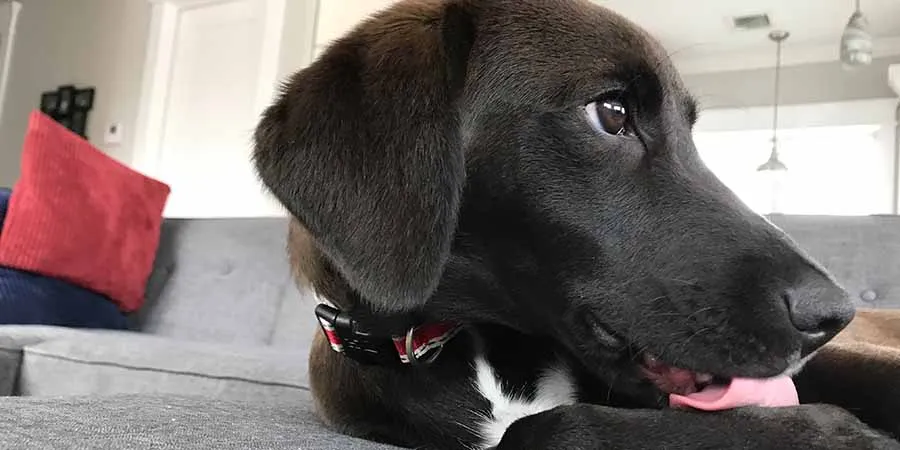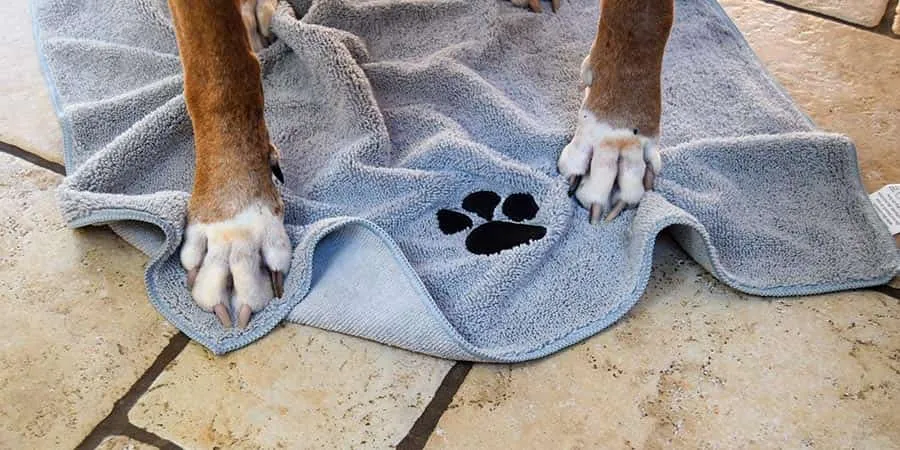If you’ve noticed your dog obsessively licking and biting its paws, you’re not alone—this is one of the most common dog behavior problems. It can range from mild nibbling to intense chewing that leads to raw, inflamed skin. While it might seem harmless at first, persistent paw licking in dogs often signals an underlying issue. The first step is always to contact your veterinarian. They can rule out medical causes through exams, tests, or treatments, ensuring you address the root problem early.
Paw licking can stem from various triggers, including allergies, parasites, pain, or even behavioral factors like boredom. Understanding these helps you provide better care and prevent complications like infections or compulsive licking disorder in dogs. In this guide, we’ll explore the main causes and practical solutions, drawing from veterinary expertise to help you keep your dog’s paws healthy.
Allergies and Parasites: Common Culprits for Itchy Paws
Skin allergies are a leading cause of dogs licking their paws excessively. Your dog might react to environmental allergens like pollen, grass, or dust mites—even if the paws never directly touch the irritant. Contact allergies from walking on treated lawns or chemicals can also provoke reactions. Signs include redness, swelling, and hot spots between the toes.
To manage this, rinse your dog’s paws with cool, plain water after every walk to remove potential irritants. Avoid harsh soaps, as they can worsen irritation. Your vet may recommend hypoallergenic shampoos, antihistamines, or allergy testing for targeted relief. According to organizations like the PDSA, early intervention prevents chronic issues.
Parasites are another frequent trigger, especially seasonally. Harvest mites, active in late summer or autumn, appear as tiny red larvae on the skin, causing intense itching. Mange mites (Sarcoptes or Demodex) burrow into the skin, leading to widespread discomfort that often starts at the paws. Fleas, though less common on feet, prompt licking as a distraction from bites elsewhere.
Regular flea preventatives and vet-prescribed treatments effectively eliminate parasites. Check your dog’s paws weekly for fleas, eggs, or unusual spots, and maintain year-round protection.
 A puppy intensely licking its paws due to irritation
A puppy intensely licking its paws due to irritation
Pain, Soreness, or Injury: When Licking Signals Discomfort
Once allergies and parasites are ruled out, soreness or injury could be the issue. Dogs lick paws to soothe stiffness in joints or minor wounds, much like humans rub a sore spot. Grass seeds, thorns, cracked pads from rough terrain, or even overgrown nails can cause pain.
Examine the paws closely: Look for cuts, swelling, foreign objects, or limping. Trim nails regularly and moisturize dry pads with vet-approved balms. If arthritis is suspected—common in older dogs—your vet might suggest joint supplements like glucosamine or pain relief.
 Close-up view of a dog's paws showing potential soreness areas
Close-up view of a dog's paws showing potential soreness areas
Behavioral Issues: Boredom, Stress, and Anxiety
Non-medical causes like boredom or anxiety often lead to habitual paw licking in dogs. Understimulated pups may chew paws out of frustration, turning it into a compulsive habit. Stress from changes like moving or new pets can trigger this self-soothing behavior.
Observe patterns: Does it happen at home when alone, or after specific events? Increase mental stimulation with puzzle toys, treat-dispensing balls, or scent games. Extra walks, play sessions, or training drills provide outlets for energy. Aim for breed-appropriate exercise—high-energy dogs like Border Collies need more than lap breeds.
For anxiety-driven licking, professional help shines. Consult a certified behaviorist from groups like the Association of Pet Behaviour Counsellors (APBC). They assess triggers and recommend desensitization or calming aids. In severe cases linking to compulsive licking disorder in dogs, medication combined with behavior modification works wonders.
Redirecting the habit early prevents escalation. Use bitter sprays on paws temporarily, but pair with positive reinforcement training to build better coping skills.
Prevention and Long-Term Management
Preventing paw licking starts with proactive care. Maintain a clean environment, use flea preventatives, and schedule regular vet check-ups. A balanced diet supports skin health—omega-3 fatty acids reduce inflammation. Monitor for triggers and log incidents to share with your vet.
If behavioral, enrich daily routines: Rotate toys, enroll in obedience classes, or try nose work. Consistency breaks the cycle.
 PDSA veterinary team providing expert pet care advice
PDSA veterinary team providing expert pet care advice
In summary, dog paw licking and biting demands prompt vet attention to pinpoint allergies, parasites, pain, or behavior. With tailored treatments, increased exercise, and enrichment, most cases resolve quickly. Your dog deserves comfortable, itch-free paws—consult a professional today for personalized guidance. Explore more tips on our site, like tackling dog behavior problems, to become your pup’s best advocate.
References
- PDSA Pet Health Hub: Skin Problems in Dogs
- PDSA: Mange in Dogs
- Association of Pet Behaviour Counsellors (APBC) for certified behaviorists.
